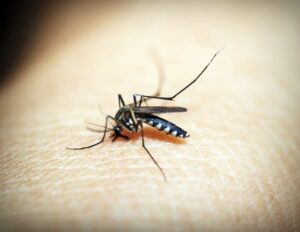Physical Address
23,24,25 & 26, 2nd Floor, Software Technology Park India, Opp: Garware Stadium,MIDC, Chikalthana, Aurangabad, Maharashtra – 431001 India
Physical Address
23,24,25 & 26, 2nd Floor, Software Technology Park India, Opp: Garware Stadium,MIDC, Chikalthana, Aurangabad, Maharashtra – 431001 India

As climate change transforms weather patterns across the globe, its impact on public health is becoming increasingly evident. In Pune, one of India’s key dengue hotspots, rising temperatures, erratic rainfall, and shifting humidity are driving an alarming surge in cases of this mosquito-borne disease. A recent study delivers an urgent wake up call for climate adaptation and public health measures by showing how projections suggest dengue could become a year-round menace in many parts of India by 2050.
The study, conducted collaboratively by Indian Institute of Tropical Meteorology (IITM) Pune, the University of Maryland (USA), the University of Pune, the University of Nottingham (UK), and officials from the Maharashtra and Pune Health Departments, offers critical insights into how climatic conditions during the monsoon season (June–September) impact dengue dynamics.
Climate Factors Driving Dengue Incidence
The research identifies a combination of factors contributing to a dengue case spike. Warm temperatures above 27°C and moderate and evenly distributed rainfall create ideal conditions for mosquito breeding and survival. Additionally, humidity levels ranging between 60% and 78% during the monsoon season further sustain the mosquitoes that transmit the dengue virus.
However, the study notes a silver lining: heavy rainfall exceeding 150 mm in a week can temporarily curb dengue outbreaks. Such intense rainfalls flush out mosquito eggs and larvae, disrupting the breeding cycle of Aedes aegypti, the primary vector for dengue transmission.
The Growing Burden of Dengue
Globally, dengue is recognized as one of the fastest-spreading mosquito-borne diseases, and its prevalence is escalating under the influence of climate change. India alone accounts for a third of the world’s dengue cases. The study warns that if immediate climate adaptation measures and public health interventions are not implemented, dengue-related deaths in India could rise significantly. Projections suggest an increase of 13% in dengue fatalities by 2030, with a staggering 23–40% increase by 2050.
Pune, a city with a conducive climate for dengue transmission, has witnessed increasing outbreaks over the years. “Our study emphasizes how climate drivers such as temperature, rainfall, and humidity contribute to dengue’s rise in Pune and other parts of India. The findings underscore the urgent need to address climate change’s health implications,” said lead researcher Sophia Yacob.
Implications for Public Health
The study serves as a call to action for policymakers, healthcare professionals, and urban planners to adopt a proactive approach to mitigate dengue’s impact. Strategies could include enhancing disease surveillance systems, scaling up mosquito control programs, and addressing water stagnation in urban areas.
“Understanding how weather patterns influence dengue helps us predict outbreaks more effectively and allocate resources for prevention and control,” said Roxy Mathew Koll, co-author of the study. He added that the findings could also inform public health campaigns aimed at raising awareness about dengue prevention during peak seasons.
Global and Local Relevance
While the study focuses on Pune, its implications extend globally. Rising temperatures, coupled with erratic rainfall, are creating favorable conditions for dengue transmission in other tropical and subtropical regions. This trend poses a growing public health challenge in the face of climate change.
In Pune, the findings highlight the importance of adapting urban infrastructure to changing climatic conditions. Measures such as improving drainage systems to prevent waterlogging, increasing funding for mosquito control programs, and integrating climate resilience into urban planning could go a long way in mitigating the disease burden.
To combat this, experts stress the importance of early-warning systems based on climate data, community engagement in mosquito control, and stronger collaboration between health and environmental agencies. Addressing the climate-dengue nexus will require sustained efforts, but the study provides a valuable foundation for data-driven decision-making.
References:
https://communities.springernature.com/posts/rising-temperatures-rising-dengue
How Climate Change is fuelling the rise of Dengue: A looming global health crisis
Banner Image: Photo by icon0
https://www.pexels.com/photo/black-mosquito-on-person-s-skin-169357
Comments are closed.
It’s truly verry comkplex in thgis full of activity liofe to listn new onn TV, so I nly use
weeb forr thazt purpose, aand obtain thee moist recet information.
Университет ресторанного бизнеса https://upskilll.ru/university UPSKILL: обучаем рестораторов, управляющих и сотрудников ресторанов, полностью адаптируя наши курсы, тренинги и программы обучения под особенности каждого заведения.
ремонт стиральных машин bosch ремонт стиральных машин лджи
Платформа Курьер Купер https://cash-kuper.ru открывает возможности для работы в доставке. Свободный график, прозрачная система оплаты и заказы поблизости – идеальный выбор для тех, кто ищет подработку или основной заработок.
На данном сайте можно найти информацией о сериале “Однажды в сказке”, развитии событий и главных персонажах. сериал однажды в сказке Здесь представлены интересные материалы о производстве шоу, актерах и фактах из-за кулис.
This piece is worth reading if you’re interested in new ideas http://besconeshnocte.flybb.ru/viewtopic.php?f=2&t=1404
Программа наблюдения за объектами – это современный инструмент для обеспечения безопасности , сочетающий инновации и простоту управления.
На сайте вы найдете детальные инструкции по выбору и настройке систем видеонаблюдения, включая онлайн-хранилища, их сильные и слабые стороны.
Программы для видеонаблюдения
Рассматриваются комбинированные системы, сочетающие облачное и локальное хранилище , что делает систему универсальной и эффективной.
Важной частью является описание передовых аналитических функций , таких как детекция движения , распознавание объектов и дополнительные алгоритмы искусственного интеллекта.